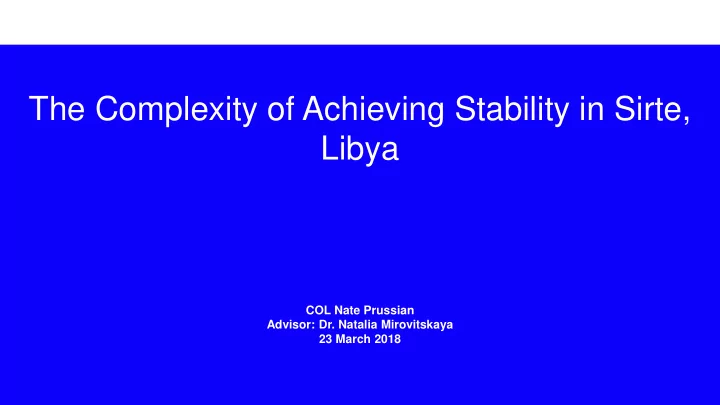

The Complexity of Achieving Stability in Sirte, Libya COL Nate Prussian Advisor: Dr. Natalia Mirovitskaya 23 March 2018
Agenda Why this matters Evolution of research Methodology Context of the problem The Problem Stakeholders Analysis Main causes Policy Recommendations COL Nate Prussian Army War College Fellow – Duke University Nathan.Prussian@duke.edu
Evolution of Research This paper conducts a stakeholder’s analysis of Libya from the perspective of USAFRICOM. The paper then recommends preliminary steps toward stability and order in Sirte, based on the understanding gained through the use of a stakeholder’s analysis. COL Nate Prussian Army War College Fellow – Duke University Nathan.Prussian@duke.edu
Methodology Secondary Sources: Literature review • Recent history of Libya – Since Qaddafi • International Humanitarian Law • Underpinnings of stabilization • Phases and programs Primary Sources: Interviews • 22 current and recently deployed USSOCOM personnel COL Nate Prussian Army War College Fellow – Duke University Nathan.Prussian@duke.edu
Context of the Problem
Context of the Problem COL Nate Prussian Army War College Fellow – Duke University Nathan.Prussian@duke.edu
The Problem Libya can’t extricate itself from its national crisis. Too many factors are pulling it apart, and there is no entity unifying the country nor efforts toward stability. Without a unified approach leading to stability there is a predictable outcome, Libya will slip further into chaos and city-state warfare. COL Nate Prussian Army War College Fellow – Duke University Nathan.Prussian@duke.edu
Stakeholders Analysis • 54 Stakeholders • 21 Represented COL Nate Prussian Army War College Fellow – Duke University Nathan.Prussian@duke.edu
Main Causes People of Sirte ostracized Lack of internal and external political unification Ineffective humanitarian programs Perceived indifference toward the situation Economic predation COL Nate Prussian Army War College Fellow – Duke University Nathan.Prussian@duke.edu
Policy Recommendations Gain access to Sirte • Bolster ERW programs • Coordinated NATO security training Establish HA coordination mechanism supporting the GNA • CMOC established in Tripoli • Direction, monitoring, coordination • US legitimacy to the GNA • Coalition COL Nate Prussian Army War College Fellow – Duke University Nathan.Prussian@duke.edu
Policy Recommendations Tribal engagement • Start with Qaddafah and Warfallah • Commit to a long-term and increasingly senior engagement • Promote the idea the GNA must be inclusive to these tribes • Key to mitigating the spawn of jihadism COL Nate Prussian Army War College Fellow – Duke University Nathan.Prussian@duke.edu
Recommend
More recommend